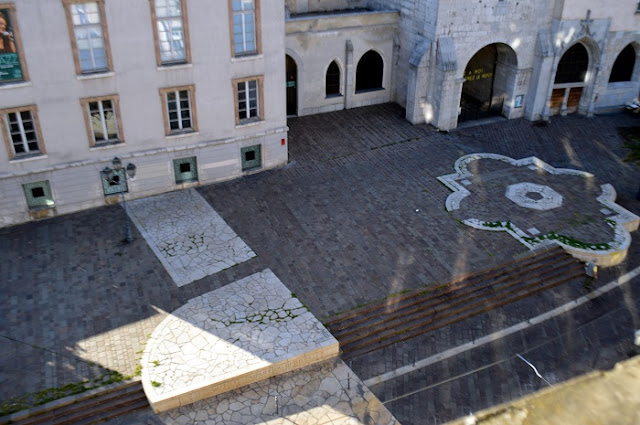Musee de l'Ancien Eveche | The Baptistery
I recently had the good
fortune to renew my acquaintance with France. The Chapples were up in the
foothills of the Alps for a family wedding, but before we headed home we
decided to spend a day in Grenoble. Once safely ensconced in Belfast, I sorted through my photos
and put a selection on social media. I was really surprised at the very
positive responses I got from a wide selection of friends and acquaintances, so
I have attempted to put together a selection for wider distribution.
The Musee de l'Ancien Eveche (Old Bishops’ Palace Museum) is a free museum, based (as the name suggests) in Grenoble’s former Episcopal Palace. While it displays and promotes the archaeological and historical past for the whole of the Isère region, I first want to look at the significance of the site itself. In 1989, archaeological excavations ahead of the installation of the tram system uncovered the remains of an early Christian baptistery. The baptistery was first built in the late fourth century and underwent many changes and developments over its 500-year life. As I understand it, the earliest phase consisted of a large, square pool about 0.75m deep to accommodate total-immersion baptisms. When liturgical changes reduced the baptism ritual to the simple sprinkling of water, the size of the pool was reduced, though the surroundings were decorated and embellished. Today, the site of the baptistery is marked out on the street while the archaeological remains have been preserved in situ directly below. Access is via the museum’s basement and the area contains other in situ material, including large portions of the city’s Roman walls.
The Musee de l'Ancien Eveche (Old Bishops’ Palace Museum) is a free museum, based (as the name suggests) in Grenoble’s former Episcopal Palace. While it displays and promotes the archaeological and historical past for the whole of the Isère region, I first want to look at the significance of the site itself. In 1989, archaeological excavations ahead of the installation of the tram system uncovered the remains of an early Christian baptistery. The baptistery was first built in the late fourth century and underwent many changes and developments over its 500-year life. As I understand it, the earliest phase consisted of a large, square pool about 0.75m deep to accommodate total-immersion baptisms. When liturgical changes reduced the baptism ritual to the simple sprinkling of water, the size of the pool was reduced, though the surroundings were decorated and embellished. Today, the site of the baptistery is marked out on the street while the archaeological remains have been preserved in situ directly below. Access is via the museum’s basement and the area contains other in situ material, including large portions of the city’s Roman walls.
Every time I visit here,
I’m simply stunned by this remarkable survival. If you get the opportunity to
visit Grenoble, I can’t recommend this place highly enough – it’s absolutely
brilliant!
 |
| Section of Roman wall discovered in excavations |
I would like to make a
comment here that applies to pretty much all of the following posts regarding
the treasures of the Musee de l'Ancien Eveche – all of the information cards I
encountered were in French with no English in sight. This is not in any way a
criticism of the museum, but of my own precarious memories of my schooldays and my tenuous grasp of the French language. To
write these posts, I’ve relied on what little French I can muster.
This has been augmented with Google Translate and a number of online OCR
services, used on images of the museum’s signage. While these technologies are
impressive, they still have quite a way to go and any errors of fact are mine
alone.
 |
| Central baptistery pool. Photographed in 2003 |
 |
| Detail of lead pipe which fed the pool. Photographed in 2003 |
 |
| Overview of baptismal pool |





Comments
Post a Comment